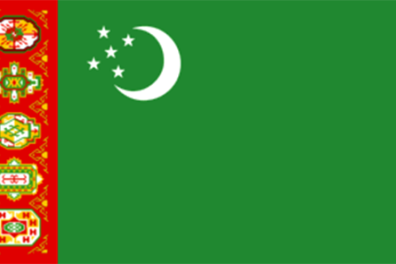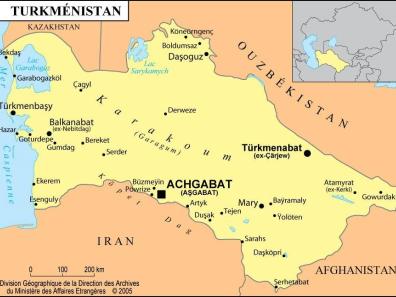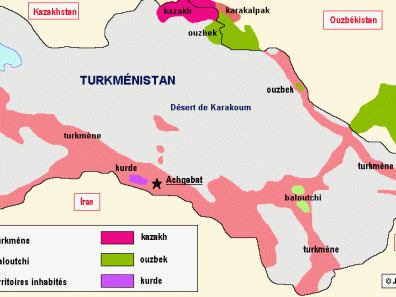Turkmenistan, the country and the language

Historically, Turkmenistan was dominated by the great empires of Turkey, Persia, Greece, Alexander the Great, Arabia, Mongolia and Russia, before becoming an independent state in 1991.
Much of Turkmenistan is covered by the Karakum (Black Sand) desert, but the country is coveted for its significant hydrocarbon resources, particularly gas (10% of world reserves).

Since the Arab conquest in the 7th century, Turkic tribes, including the Turkmen, began to adopt Islam. Following Islamization, the Arabic alphabet became established in the various branches of the Turkic world.
After the Russian October Revolution (1917), the Turkmen gained brief independence. However, the Red Army regained control of the country in 1920, and in 1924 the Federated Soviet Socialist Republic of Turkmenistan was created.
In 1985, Saparmurat Niyazov, former First Secretary of the Turkmen Communist Party, became President of Turkmenistan. Following the collapse of the Soviet Union, after more than a century of Russian domination, the former Soviet republic became independent in 1991 with a one-party regime (Turkmenistan Democratic Party). The first president, Saparmurat Niyazov, nicknamed Turkmenbashi (Father of the Turkmen), was replaced in 2007 by Gurbanguly Berdimuhamedov, nicknamed "Arkadag" (Protector).
The language
Turkmen (Türkmence) is a language belonging to the group of Turkic languages known as the Altaic family, spoken by over six million people in Turkmenistan and neighboring countries.
Already in 1990, the Turkmen language was declared the official language of the Soviet Republic by the "Law on the Language of the Soviet Socialist Republic of Turkmenistan", still in force today.
Turkmen is a language close to Turkish in its fundamental structures; moreover, like other Turkic-speaking countries, Turkmenistan has adopted a new Latin-based alphabet like that of Turkish.
In the Turkic family, Turkmen belongs to the Oghuz language group, along with Turkish, Azeri and Gagauz. Turkmen thus has more affinities with Turkish and Azeri than with other Turkic languages. It shares the main characteristics of the linguistic family: agglutination (suffixes attached to nouns), vowel harmony (a certain succession of vowels in words) and the regularity of the linguistic system, without distinction of gender (masculine, feminine) and Latin script.
The standard Turkmen language corresponds to a literary variety elaborated during the Soviet regime on the basis of the dialects of two important tribes: ÿomud and tekke.
While it has retained its Turkic structures in its grammar and syntax, it has had to borrow many words from neighboring languages, especially Russian, but also Iranian (Farsi) and, since independence, English and Turkish.
The majority of the population speaks Turkmen, sometimes called Turkoman, but as the country has many ethnic groups, other minority languages, most of which are Turkic, are also spoken: Uzbek (9%), Tatar (1.4%) and Kazakh (0.4%); as well as Russian (2.7%) and Armenian (1.4%).

Among all minority languages, Russian has a special status; under the Soviet Union, Russian was the language of inter-ethnic communication, relegating Turkmen to the background. Today, Russian is still used mainly in political, administrative and economic life. Russian is also spoken by the country's minorities: Ukrainians, Armenians, Koreans and Germans.
However, since independence, Turkmenistan has followed a policy of ousting the Russian language in favor of Turkmen in all areas of public life.
Alphabets
Throughout its history, Turkmenistan has used four different alphabets: the Arabic alphabet (approx. from 1000 to 1928), the Latin alphabet (from 1928 to 1939), the Cyrillic alphabet which Joseph Stalin imposed as in the other Turkic republics (from 1940 to 1993) and again the Latin alphabet (from 1993 to the present day). The current alphabet has 30 letters (9 vowels and 21 consonants).
Philippe-Schmerka Blacher, a late Inalco alumnus, studied Turkmen grammar and devised a learning method[1].
While Turkmen has long been considered an essentially oral language, it has also developed a written literature since the 18th century.
The best product of this tradition is the Book of Dede Korkut: An epic, epic narrative composed around the 8th century. Versions in Turkish, Turkmen and Azeri are still circulated[2].
The poet Magtymguly Pyragy (1724-1733 - 1807) is an emblematic figure of this literature. To mark the 290th anniversary of his birth, a ceremony was organized at Inalco in December 2013, under the patronage of the Turkmen Embassy in France.
We reproduce here an extract from a poem by Magtymguly translated from Turkmen by Louis Bazin and Pertev Naili Boratav.
The Turkmen
"Between the Amu-Derya and the Caspian Sea
On the steppe blows the wind of the Turkmen.
It is a rosebud, it is the dark apple of my black eyes,
The Mountain is black, whence descends the torrent of the Turkmen!
God has singled them out, they live in his shadow
In their steppe male and female camels frolic,
Multicolored flowers bloom on their verdant plateaus;
It disappears under the basilisks, the steppe of the Turkmen!
Draped in red and green cloth, their young fairies stroll
An amber perfume fills the air with these sweet scents.
With their beys, their princes, their wise elders, masters of the land,
They set up their well-populated encampments, the beautiful tribes of the Turkmen!!
They are the sons of the brave. Their ancestors are heroes.
Köroğlu is their brother. They are intoxicated with valour.
If by mounts and plains, hunters stalking them,
They cannot take them alive, these tigers that are the sons of the Turkmen!!
(...)
Full of intoxication, they go forth, no sorrow burns their hearts,
Nothing can bar their way, they break even rocks...
My eyes cannot look elsewhere, my heart is impatient.
I, Magtymguly, am the speaking mouth of the Turkmen!"
Michel Bozdémir
University professor emeritus of Turkish language and civilization
[1] Philippe-Schmerka Blacher, Parlons turkmène. Türkmençe gepleýäris, Paris, L'Harmattan, 2002.
[2] Le livre de Dede Korkut, Récit de la gente oghuz, translated and presented by Louis Bazin and Altan Gökalp, Gallimard, 1998.